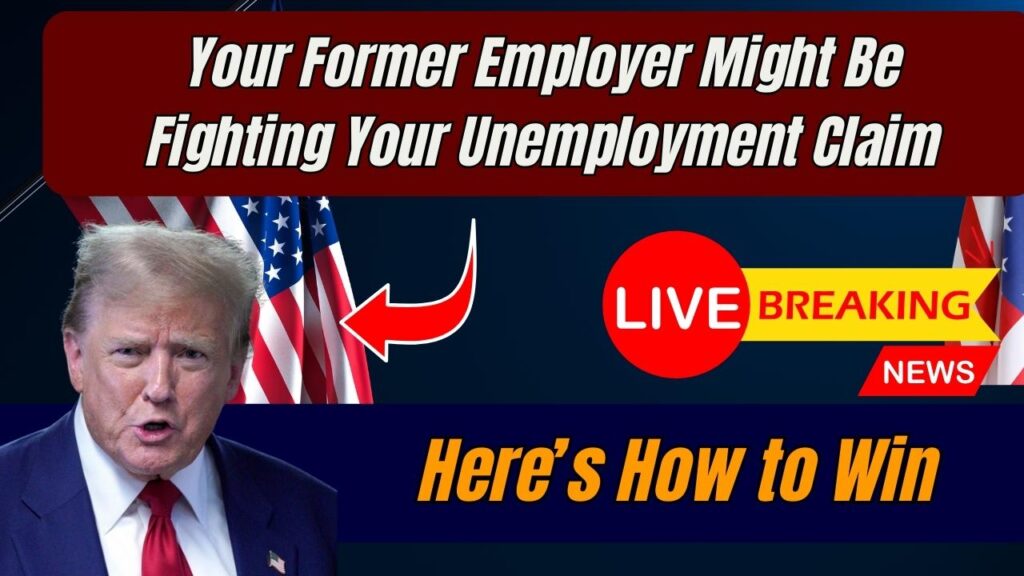Your Former Employer Might Be Fighting Your Unemployment Claim – If you recently filed for unemployment and got a surprising notice that your former employer is contesting your claim, you’re not alone. Many people are shocked to learn that employers can legally dispute your eligibility for unemployment benefits—even when you’ve done nothing wrong.

This article will walk you through why this happens, how to respond, and what steps to take to win your unemployment case. Whether you’re a first-time filer or a professional handling a complicated dismissal, this is your go-to guide.
Your Former Employer Might Be Fighting Your Unemployment Claim
| Topic | Details |
|---|---|
| Why Employers Contest Claims | To reduce taxes, claim you quit, or were fired for cause |
| How to Win Your Case | Gather documentation, present your case, prepare for hearing |
| Hearing Type | Phone, video, or in-person hearing depending on your state |
| Typical Weekly Benefit (2024) | $300–$600 depending on state, work history |
| Appeal Deadline | 10–30 days post-denial |
| Helpful Resources | USA.gov Unemployment Help, CareerOneStop |
If your former employer is fighting your unemployment claim, it’s not the end of the road. You have rights—and by staying informed, organized, and proactive, you can win your hearing and secure the benefits you deserve. The state will decide based on evidence, not assumptions.
Why Do Employers Fight Unemployment Claims?
Many companies dispute unemployment claims to protect their bottom line. When former employees receive unemployment, it can increase the employer’s unemployment insurance tax rate.
Common reasons employers contest claims:
- They claim you quit voluntarily (making you ineligible).
- They say you were fired for misconduct.
- They argue you refused suitable work.
- They simply want to avoid any increase in their payroll taxes.
Sometimes, it’s not personal—it’s financial. But you have every right to fight back.
How Often Do Employers Win Unemployment Disputes?
According to a U.S. Department of Labor study, around 45% of claimants win contested unemployment cases. The odds are higher when:
- You present documentation.
- Your employer lacks evidence.
- You attend and participate in the hearing.
Claimants who show up with evidence are twice as likely to win.
Common Employer Tactics to Watch For
| Tactic | What It Means | How to Respond |
|---|---|---|
| Claiming you quit | Employer may say you left on your own | Show texts, emails proving otherwise |
| Vague misconduct | “Poor attitude” or “insubordination” | Ask for documentation—was it in writing? |
| Lack of warnings | Employer didn’t warn you first | Reference the company’s own policy manual |
| Attendance excuses | Saying you were often late | Use timecards or punch logs to counter |
Important: Employers must prove any misconduct with evidence, not just accusations.
Step-by-Step: How to Win If Your Claim Is Contested?
Step 1: Read the Notice Carefully
If your state’s unemployment agency notifies you that your claim is being challenged, don’t ignore it. You’ll usually get a scheduled hearing—and this is your chance to defend your right to benefits.
Step 2: Gather Evidence
Prepare your supporting documents:
- Offer letters
- Pay stubs
- Termination letters
- Emails from your boss
- Positive performance reviews
- Screenshots or written warnings
- Company policy handbook
The more paper trail, the better.
Step 3: Prepare for the Hearing
Most hearings happen via phone or video. You’ll be sworn in and can present evidence. The hearing officer is neutral—their job is to look at the facts.
Sample Script
You: “I was let go without warning. Here’s my last performance review, which shows I met all expectations. There was no written misconduct or verbal notice.”
Keep all papers ready. Speak clearly and stay respectful—even if your former employer is not.
Step 4: Know the Rules in Your State
Each state’s process is different. Use the U.S. Department of Labor State Directory to find your state’s exact process.
State-by-State Unemployment Links
| State | Unemployment Website |
|---|---|
| California | edd.ca.gov |
| Florida | floridajobs.org |
| Texas | twc.texas.gov |
| New York | labor.ny.gov |
| View all states → | CareerOneStop Directory |
Real Advice from People Who’ve Been There
“I brought in old performance reviews and emails from coworkers, and the judge ruled in my favor. The employer had nothing.”
— Jason, Ohio
“The key is to be calm and organized. I made a list of bullet points and practiced saying them aloud before my call.”
— Leticia, Arizona
US Unclaimed Unemployment Funds: Are You Missing Out on Thousands?
US Savings Bond 2025 : Know Amount, Eligibility, Benefits & Fact Check
Trump’s Federal Aid Freeze: Shocking Impact on Payments – Check Are You Affected?
FAQs About Your Former Employer Might Be Fighting Your Unemployment Claim
Can my employer really stop my unemployment?
No—they can challenge it, but the state makes the final decision.
Do I need a lawyer?
You don’t need one, but it helps. Some legal aid organizations provide free representation. You can check LawHelp.org for help in your area.
What is considered “just cause” for being fired?
The most common include:
- Willful misconduct
- Theft or dishonesty
- Harassment
- Repeated violation of written rules
If you were fired for minor issues or personal disagreements, that usually doesn’t count as misconduct.
What if I miss the hearing?
If you don’t show up, you’ll likely lose by default. Always attend—or request a reschedule in advance.







